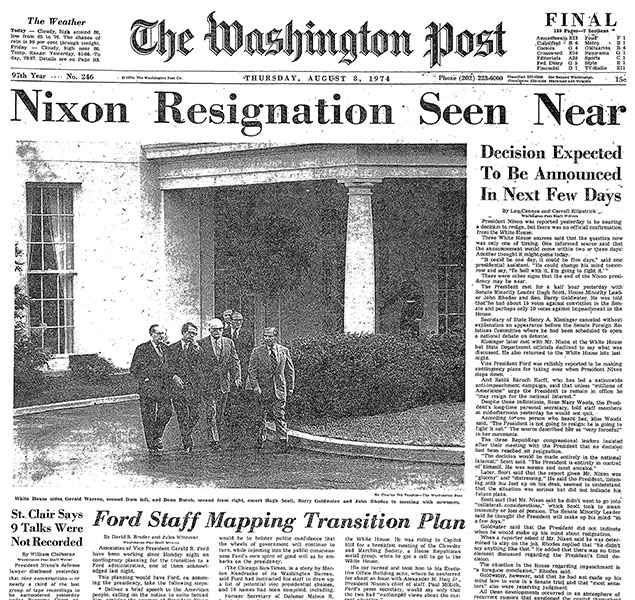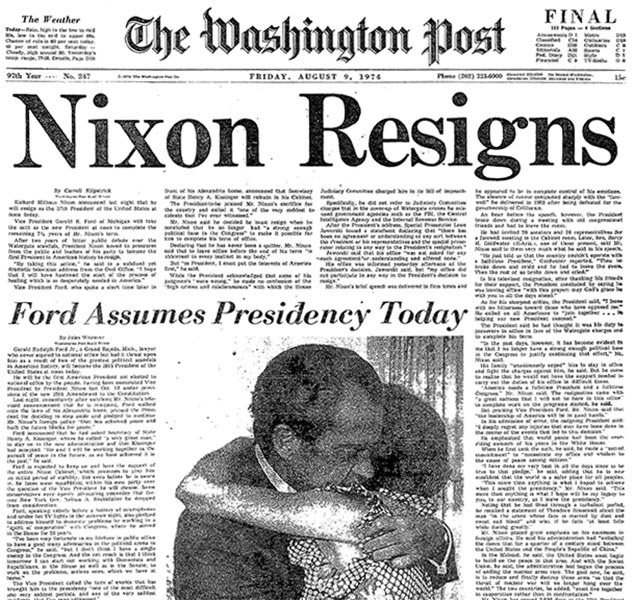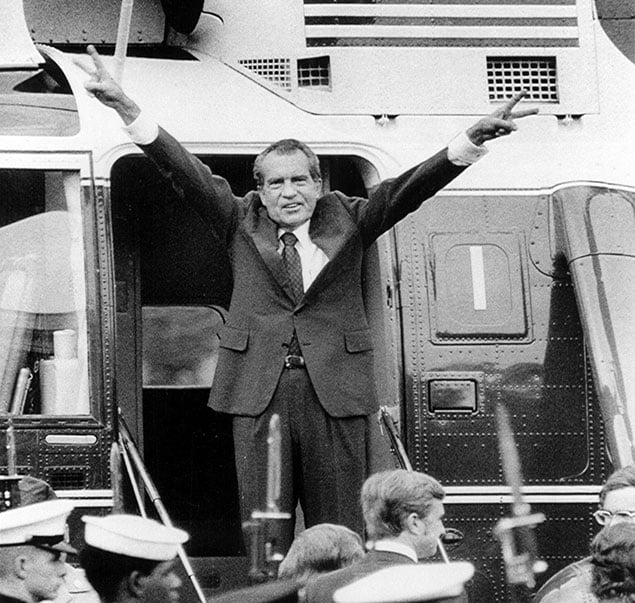On August 8, 1974, Richard Milhous Nixon resigned the presidency in the wake of the Watergate scandal. It was big news, of course—but it wasn’t the only news that week. Here’s a time capsule of sorts—a sampling of headlines from the Washington Post on August 8 and August 9. The headlines—some surprisingly familiar, some shockingly prescient—go to show that everything old is new again, including the news.
August 8, 1974

“Marijuana Law Upheld in District”
The DC Court of Appeals upheld the District’s ban on marijuana, rebuffing rogue Superior Court judge David L. Norman, who declared the law unconstitutional in April. Arrests for marijuana possession had surged from 255 in 1971 to 2,553 in 1973, with penalties of up to one year of jail time and a $1,000 fine for a first conviction. Where was the newspaper of record when you needed it?
“The Case of the Curious Convenience-Food Comparison”
The US Department of Agriculture released a study purporting to show that canned and frozen foods were as cheap or cheaper than those made from scratch. USDA economist Larry Traub, who omitted nutritional value from his analysis, made the mouthwatering assertion that “the lower cost of convenience meat items results, in part, from the fact that much more of the edible meat is used, enabling processors to more efficiently utilize a carcass.”
“Aerialist Defies Death in Manhattan”
On August 7, a 24-year-old street performer named Philippe Petit walked a tightrope between New York’s Twin Towers, balancing 1,350 feet in the air for nearly an hour. Back on the ground, the daredevil was promptly arrested and taken in for psychological evaluation, but the charges of criminal trespass and disorderly conduct were dropped. As Petit put it, “If I see three oranges, I have to juggle. And if I see two towers, I have to walk.”
“Congressmen Urge U.S. Leverage on Oil”
Several members of Congress pushed for the US to take a “stronger hand” in negotiating lower prices from oil-producing nations, while Assistant Secretary of State Alfred Atherton “expressed reservations” about direct government involvement. Atherton also said the US “sought to encourage cooperation between Saudi Arabia and Iran—the two wealthiest and potentially most powerful countries in the Persian Gulf.”
“U.S. Pulls Out Taiwan Jets As China Builds Its Forces”
With Communist Chinese missile-firing boats deployed “closer to the Taiwan Straits than ever before,” the US withdrew half of its F-4 warplanes from Taiwan and sent them to the Philippines—though Defense officials maintained that “the United States remains committed to defend Nationalist China.”
“Libya Spurns Charges by Sadat of Hostile Acts”
In a strongly-worded letter to Libya’s ruling Revolutionary Command Council, headed by Muammar Gaddafi, Egyptian president Anwar Sadat accused Libya of “attempting sabotage and assassination in Egypt.”
“Federal Reserve Readies Emergency Loan Plan”
After bailing out Franklin National—then the nation’s 20th largest bank—in May, the Fed was “tuning up” a multibillion-dollar emergency loan program to protect the US from future bank and business failures. Fed chairman Arthur Burns insisted, with tragically poor foresight, that the chances of having to use these emergency tactics were “most remote.”
August 9, 1974

“Metro Cost Jumps to $4 Billion”
Think the Silver Line’s $150 million cost overrun is bad? In August 1974, Metro, blaming delays caused by strikes, tropical storm Agnes, and accessibility provisions, projected that the total cost of the transit system would increase by almost $1 billion, to $3.874 billion, by its 1981 completion date.
“Airport Transit Plan Voted”
The Senate approved, as part of an Amtrak funding bill, $3 million for the “study and planning” of rapid-transit systems to link the District to BWI and Dulles airports. An earlier version of the bill, which one senator said unfairly “help[ed] the richest counties in the world,” would have authorized $10 million for a rail system connecting Dulles, via the Dulles Access Road and Route 7, to Metrorail tracks that we’re still waiting for.
“House Passes Campaign Reform Bill”
In the wake of Watergate, the House approved contribution limits of $1,000 per individual and $5,000 per group for congressional and presidential campaigns, along with other amendments to the Federal Election Campaign Act. The final version of this bill, after passing through both houses of Congress, contained aggregate limits on campaign donations, which were struck down this April in McCutcheon v. FEC.
“Jordan Ready to Negotiate on Israeli Troop Pullback”
Following Israel’s disengagement deals with Egypt and Syria, Jordan’s prime minister, Zaid Rifai, notified US Secretary of State Henry Kissinger that the country was prepared to negotiate the drawdown of Israeli troops in the West Bank. Jordanian officials said they would be open to a disengagement leaving an initial “leopard-spot arrangement” of Israeli forces, unlike the straight-line pullback to which Egypt and Syria had agreed.
“Egyptian Reserves Mobilized Quietly”
In spite of Kissinger’s “shuttle diplomacy” efforts, Egypt called up some of its reserves in response to Israeli mobilization exercises on the Syrian border, which Egyptian foreign minister Ismail Fahmi called “warlike.”
“Variable Rate Plan Sent to Congress”
The Federal Home Loan Bank Board (FHLBB) asked Congress to authorize an adjustable-rate mortgage (ARM), in response to rapidly rising interest rates that threatened the housing industry.
“Panel Approves Securities Reform”
The House commerce and finance committee submitted a bill giving the Securities and Exchange Commission “broad authority” to regulate the nation’s securities markets. The Post called it “the most comprehensive bill of its kind since the 1930s.”
“Ali Goes for the Knockout with Some Choice Verse”
Muhammad Ali arrived in Zaire to train for his historic October 1974 bout with George Foreman, dubbing it the “rumble in the jungle.”
“City’s Baseball Hopes Soar with NL Expansion Vote”
National League club owners met in New York to discuss prospects for new major-league baseball franchises in Washington, Toronto, and Buffalo.
“NFL Strike Settlement Called Possible Today”
Thirty-nine days into the strike, a federal mediator said that the NFL Players Association and the club owners were close to an agreement. The strike would, in fact, end the next day.
“Networks Held Back As Resignation Rumors Spread”
In a world before CNN, the big three networks “showed restraint” in the lead-up to Nixon’s announcement, “cut[ting] their bulletins or special reports to brief, regular updates on the hour or half-hour.” Then, on the night of August 8, they “descended on the story in force.”


















